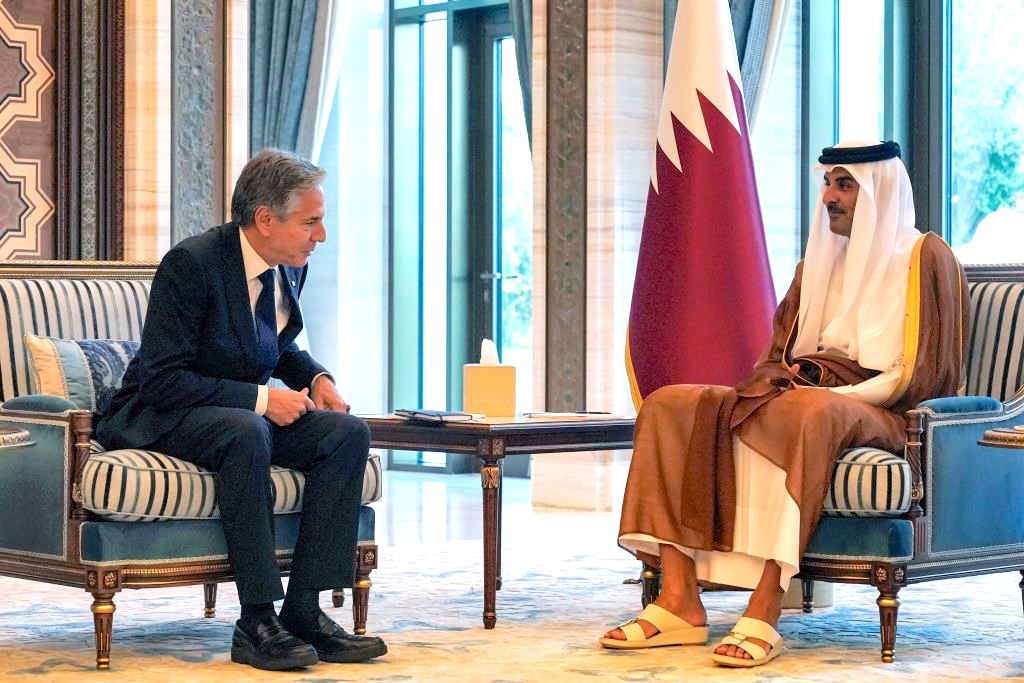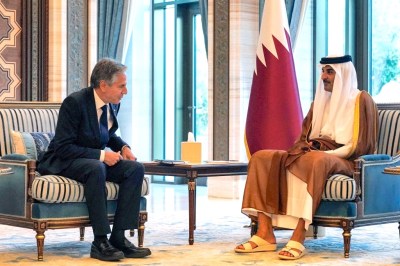TEL AVIV, Israel—Despite still mourning Hamas’ brutal attack on October 7 and prosecuting a war against the terrorist group, Israel has cautiously rejoiced this week as a temporary pause in fighting was extended to a seventh day to allow for the return of hostages from Gaza continued. Negotiators on early Thursday morning once again re-upped an internationally brokered agreement which, in exchange for the release of Palestinian prisoners and a pause in fighting, has now secured the freedom of 71 of the more than 160 Israelis who were kidnapped by Hamas-led terrorists on October 7.
American officials—including President Joe Biden—have thanked one nation in particular for its help in reaching the deal: Qatar, a small, oil-rich monarchy that maintains relationships with both Washington and violent Islamist movements, including Hamas. The praise comes after the U.S. began to scrutinize Qatar’s support for the terrorist group in the immediate aftermath of Hamas’ attack on Israel last month, but the rhetorical reversal points to the U.S. and Israel’s uncomfortable reliance on the Persian Gulf emirate as hostage negotiations continue.
“We are conducting business with Qatar because it is what needs to be done in order to bring our kidnapped citizens home from Hamas’ hands,” an Israeli official told The Dispatch, speaking on the condition of anonymity due to the sensitive nature of the ongoing talks. “This is, at the end of the day, what we are striving for. Almost all means are on the table.”
Thursday’s breakthrough in negotiations came two days after CIA Director William Burns met with David Barnea, chief of Israel’s Mossad spy agency, in Qatar’s capital of Doha, where Qatari mediators have reportedly been pushing for a more “sustainable” ceasefire agreement. While Qatar’s diplomatic overtures have earned accolades from the likes of Biden and other Western leaders, some analysts argue its push for a permanent truce reveals its true ambition: helping Hamas—a longtime recipient of Qatari political and financial support—live to fight another day. The small nation has sunk significant diplomatic energy into Gaza’s de facto leaders, a gamble that may leave it empty-handed if Hamas is eliminated, as Israel hopes.
“The Qataris are doing this not because they feel some humanitarian obligation to the hostages. They’re doing this to try to help secure a more permanent pause in fighting,” Jonathan Schanzer, senior vice president for research at the Foundation for Defense of Democracies (FDD), said in an interview. “Qatar—through its funding of Hamas, through its provision of safe haven to Hamas over the years—helped create the circumstances under which 10/7 occurred. And by acting as a middleman now, it’s ensuring the survival of Hamas slowly but surely.”
Qatar’s ties to the terrorist group can be traced back more than a decade, as the Arab Spring swept the region and the small nation saw opportunity in the rise of the Muslim Brotherhood and its Palestinian branch of Hamas. In 2012, the Gulf State’s emir became the first head-of-state to visit the Gaza Strip since its takeover by Hamas five years earlier. The same year, Hamas moved its political bureau from Damascus, Syria, to Doha—diplomatic outreach accompanied by Qatar’s steady flow of cash to the territory, which in total is estimated to have reached more than $1.8 billion. The relationship grew stronger during the Syrian Civil War, when Hamas’ ties with Iran frayed over the Islamic Republic’s support for the Assad regime amid its killing of Palestinians and other Arabs, forcing the group to seek another state sponsor. Hamas, Damascus, and Tehran have since mended ties, but the group’s relationship with Doha persists.
But Hamas isn’t the only beneficiary of Qatar’s political patronage. The country has fostered ties with radical Islamist movements across the Middle East and Central Asia, including the Muslim Brotherhood and the Taliban. In 2017, reports compiled by FDD revealed al-Qaeda and Islamic State financiers had openly operated and fundraised on Qatari soil.
But these links—however unsavory—have actually made Qatar a diplomatic asset, not a pariah, in the eyes of the U.S. and other liberal countries. Although the Biden administration’s withdrawal from Afghanistan ended disastrously in 2021, the wheels for such a move were set in motion years earlier by a Trump-era deal negotiated with the Taliban from Qatar. Doha also had a hand in an agreement earlier this year that would have transferred $6 billion in frozen oil funds to Tehran in exchange for the release of five Americans from Iranian custody.
While analysts like Schanzer say Qatar is pushing for a ceasefire to ensure Hamas’ survival, others argue its intermediary role is more pragmatic. The emirate’s tendency to serve as a go-between is baked into its 2003 Constitution, which states foreign policy should be guided by the goal of “encouraging the settlement of international disputes by peaceful means.” What isn’t included in the document is Doha’s financial or political backing of terrorist groups, but Qatari officials argue their diplomatic objectives are served by pursuing close ties to politically noxious groups that the West won’t interact with directly.
“Qatar tries to live in the world as it is, not as we would like it to be,” David B. Roberts, author of the book Security Politics in the Gulf Monarchies and a senior lecturer at King’s College London, told The Dispatch. The country, he added, has “doubled down” on its relationship with Hamas in recent years “with the full sort of connivance and understanding of the U.S. and Israel. Therefore, when everything went horribly wrong on October 7, it was obvious that that is why there was a trail of international liaisons going to Doha to help with the hostage situation, because they’ve had these relations for so long.”
Qatar claims that it established indirect communication with Hamas at the behest of the United States. According to recent reporting, Obama administration officials pushed for the 2012 establishment of Hamas’ political office in Doha in the hopes the U.S. could exert soft power over the group. But Qatar’s relationship with the Palestinian organization predated Washington’s direct outreach. For years prior, top Hamas officials had met with Qatari leaders, run official offices in Doha, and fundraised from Qatar—which Qatari officials knew.
Israel insists that dismantling Hamas’ military and governing capabilities in the Gaza Strip remains its main objective, but if Qatar’s cause is to provide cover for Hamas, it may be picking up traction. In a tweet Tuesday night, Biden added fuel to calls for ending Israel’s offensive into Gaza. “Hamas unleashed a terrorist attack because they fear nothing more than Israelis and Palestinians living side by side in peace,” he said. “To continue down the path of terror, violence, killing, and war is to give Hamas what they seek. We can’t do that.”
Biden’s remarks elicited a warning from those more skeptical of Qatar’s motivations, including Schanzer. “There are plenty of options, but we’ve chosen to go with the country that is a financial, political, and diplomatic advocate for Hamas,” he told The Dispatch, pointing to Egypt and the United Arab Emirates as preferable partners in leading negotiations for the release of Israeli hostages. “Qatar wants the war to end on Hamas’ terms, not Israel’s terms. They are essentially the advocates against the defeat of violent Islamist movements.”







Please note that we at The Dispatch hold ourselves, our work, and our commenters to a higher standard than other places on the internet. We welcome comments that foster genuine debate or discussion—including comments critical of us or our work—but responses that include ad hominem attacks on fellow Dispatch members or are intended to stoke fear and anger may be moderated.
With your membership, you only have the ability to comment on The Morning Dispatch articles. Consider upgrading to join the conversation everywhere.